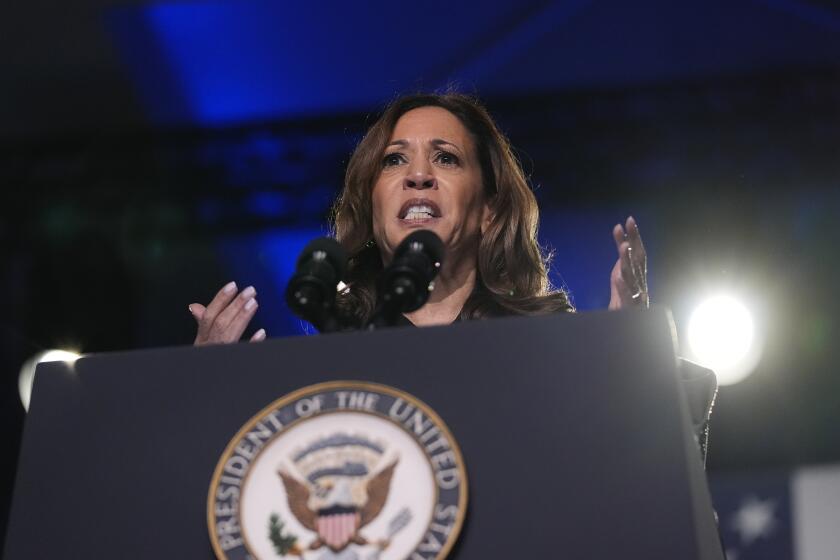Conservative Social Agenda a GOP Challenge
Emboldened by the Republican control of Congress, conservative activists are predicting long-awaited legislative victories this year on several contentious social issues, including a ban on late-term abortions and approval of federal judges sympathetic to their causes.
Fueling their hopes are recent actions by President Bush, who has been tending his political base among social conservatives with assiduous care -- even at a time when economic and foreign policy issues are dominant.
This week, Bush decided to join with anti-affirmative action forces in a major Supreme Court case. He proclaimed today as National Sanctity of Human Life Day, just as the capital prepares for massive demonstrations Wednesday that mark the 30th anniversary of the Supreme Court’s landmark decision establishing a constitutional right to abortion. Last week, Bush renominated a controversial conservative judge, Charles W. Pickering Sr., to a federal appeals court.
Some moderate Republicans fear that their party’s efforts to broaden its base and appeal to swing voters could be undermined if Congress overreaches on divisive social issues, especially abortion.
“I just hope [party leaders] recognize there are other issues we have to pursue -- and the abortion issue shouldn’t be one of them,” said Sen. Olympia J. Snowe (R-Maine), an abortion-rights supporter. “It creates the perception about our party as one that is intolerant.”
But others argue that the party cannot afford to give short shrift to social issues dear to conservatives. This is especially true among religious conservatives, whose agenda was thwarted during Bush’s first two years by the Democrat-controlled Senate.
“These voters need to feel two years from now that it did make a difference in terms of having a Republican majority” in both the House and Senate, said Bill McInturff, a GOP pollster.
A conservative group made that point in a December letter to Rep. Joseph R. Pitts (R-Pa.) outlining their agenda, which included abortion restrictions, tax breaks for families, welfare reform, a ban on Internet gambling and more aid to faith-based charities.
“If these issues are not dealt with promptly, it will be a wasted opportunity and a great disappointment to those who voted to elect pro-family leaders,” said the Concerned Women for America, an organization of religious conservatives.
A big test of Bush’s commitment to the social conservative agenda will come if he gets a chance to fill a seat on the U.S. Supreme Court -- an appointment that could affect abortion and other social issues more than any bill before Congress.
On Capitol Hill, the agenda of social conservatives is expected to sail through the House, as it did in the last Congress. In a striking demonstration of their clout in the House, antiabortion forces late last year defeated a bankruptcy reform bill backed by GOP leaders. They rebelled because the bill included a provision designed to crack down on antiabortion protesters.
The Senate, even though it now is under Republican control, remains a rougher road for the conservative social agenda because of rules that allow a minority to block legislation by filibuster. That means it takes 60 votes to pass most legislation, not just a simple majority of 51.
Douglas Johnson, head of the National Right to Life Committee, calculates that the 2002 elections produced a net gain of one antiabortion vote in the Senate. A majority of the Senate still supports the decision in Roe vs. Wade, he said.
That’s why the social conservative agenda includes mostly incremental measures that do not strike directly at abortion rights, but instead aim to make the procedure more difficult to obtain or harder to legally justify.
“Nibbling around the edges is what it feels like,” said Cathy Carver, spokeswoman on abortion issues for the U.S. Conference of Catholic Bishops.
The No. 1 issue on the agenda -- and the one most likely to become law -- is legislation banning a procedure known by critics as partial-birth abortion. That would be a big victory for social conservatives, who have been pushing the measure since 1995. Earlier versions cleared Congress in 1996 and 1997; both were vetoed by President Clinton. Now, with an antiabortion president in power, even opponents of the bill concede it is likely to become law.
Senate Majority Leader Bill Frist (R-Tenn.) said he expects the ban to come before the Senate “very, very quickly.” The key question is whether it will prove constitutional. The Supreme Court in 2000 struck down a similar Nebraska law because it failed to provide adequate protection for the woman’s health.
Another conservative priority is a bill to ban human cloning. It passed the House last year but never came to a vote in the Senate, where many lawmakers expressed concern that the bill would squelch important medical research that uses cloning techniques.
Johnson of the antiabortion group said he believed the 2002 elections increased the number of anticloning Senate votes by three. But, he added, precise head counts were difficult because the issue is so new and untested.
“Cloning is still very much in flux,” Johnson said. “There are a lot of senators with ambiguous positions, confused positions, evolving positions.”
Antiabortion activists are hoping to force action on two other bills that passed the House last year but languished in the Senate.
One would provide for a person who harms or kills a pregnant woman to be charged with a separate crime of killing or harming the fetus. Abortion-rights advocates oppose the bill because they view it as an effort to establish legal rights for a fetus.
Another bill would make it a crime to transport a minor across state lines for an abortion in order to evade parental notification laws.
Abortion-rights advocates hope to block those bills in the Senate, but acknowledge it could be a tough fight.
“These are proposals that are designed to sound moderate and aren’t,” said Mary Jane Gallagher, executive vice president of the National Abortion and Reproductive Rights Action League’s Pro-Choice America.
Probably no piece of legislation before Congress will have as long-lasting an effect on abortion, affirmative action and other social policies as the decisions the Senate makes on nominations to the federal judiciary. Through their decisions, these judges exercise great power in shaping social policy.
That’s why conservative activists and their liberal counterparts are gearing up for big battles over Pickering and some other Bush nominees -- and will be thrown into a battle royal if a Supreme Court vacancy occurs.
“The courts have been the trump card” in social policy through their interpretations of the law, said Gary Bauer, a conservative activist.
More to Read
Get the L.A. Times Politics newsletter
Deeply reported insights into legislation, politics and policy from Sacramento, Washington and beyond. In your inbox three times per week.
You may occasionally receive promotional content from the Los Angeles Times.











